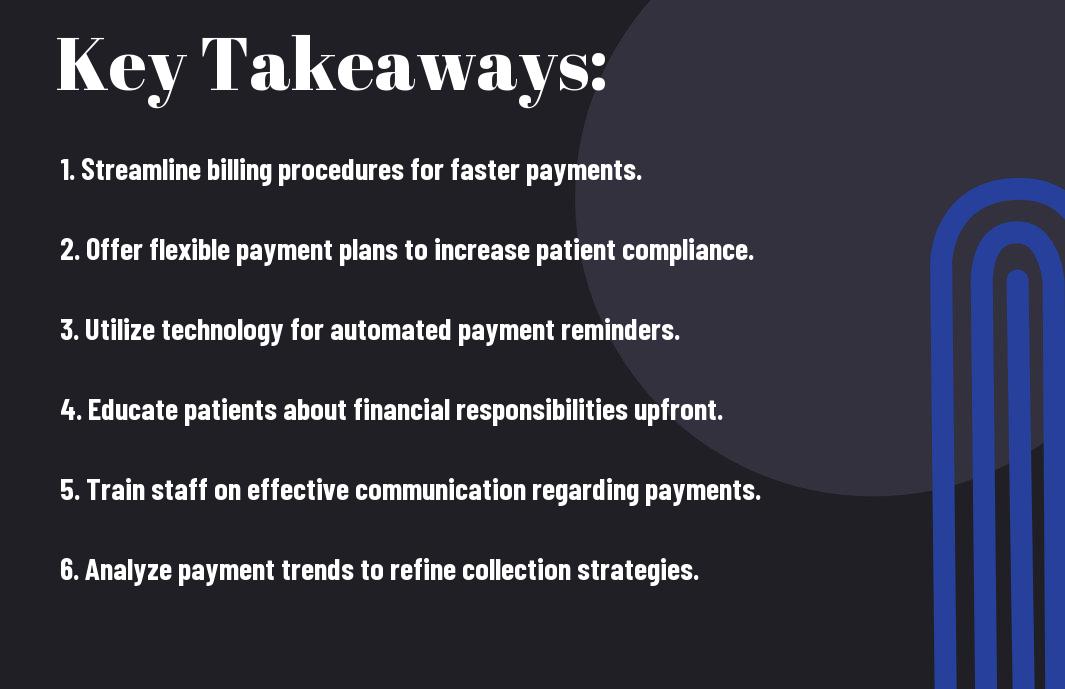Master Dental Collections with Proven Payment Tips
Dental practices often face challenges in managing payment processes effectively, which can impact both cash flow and patient satisfaction. In this blog post, I will share some imperative tips that you can implement to streamline your collections and ensure timely payments. By optimizing your payment processes, you not only enhance the financial health of your practice but also improve patient experience. Let’s explore strategies that empower you to take control of your collections and foster a more efficient billing system.
Key Takeaways:
- Implement clear communication strategies to explain payment processes to patients, ensuring they understand their obligations and available options.
- Utilize technology, such as automated billing systems, to streamline payment collections and reduce administrative workload.
- Offer flexible payment plans and financing options to accommodate diverse patient needs and encourage timely payments.
- Regularly review and update your payment policies to reflect industry best practices and maintain transparency with patients.
- Train the dental team on effective collection techniques and the importance of managing finances professionally and empathetically.

Understanding Payment Processes
Before exploring into optimizing payment processes, it’s crucial to understand the payment landscape in your dental practice. Navigating billing can be complicated for both you and your patients. Familiarizing yourself with various payment options and their implications will lead to smoother transactions. For additional insights, check out Top 8 Tips to Improve Your Dental Practice’s Collection Rates.
Overview of Payment Systems
Overview of payment systems is vital for ensuring your practice runs efficiently. Various options, such as credit cards, insurance billing, and payment plans, can cater to your patients’ needs. Understanding how these systems integrate into your workflow allows you to streamline transactions and enhance patient satisfaction.
Common Payment Challenges in Dentistry
Along the way, you may encounter common payment challenges that can hinder your practice’s financial health. Delayed insurance reimbursements, patient non-payment, and unclear billing practices can create significant issues. It’s imperative to identify these challenges early and develop strategies to address them effectively.
This is where identifying common payment challenges becomes paramount. Delayed insurance reimbursements can disrupt cash flow, leading to frustrations for you and your staff. Additionally, dealing with patient non-payment can impact your practice substantially, especially if you don’t have clear policies in place. Lastly, unclear billing practices can lead to misunderstandings, causing dissatisfaction among patients. Addressing these challenges not only improves your collection rates but also fosters stronger relationships with your patients.

Strategies for Effective Billing
Assuming you implement effective billing strategies, you can streamline your payment processes and enhance patient satisfaction. Clear communication and consistency in your billing approach will not only minimize errors but also foster trust with your patients. By prioritizing your systems, you can create a seamless financial experience that benefits both your practice and your patients.
Transparent Pricing Practices
Transparent pricing practices are crucial for building trust with your patients. When you clearly communicate costs upfront, patients feel more comfortable and are less likely to have disputes later. Providing detailed estimates for treatments allows you to set accurate expectations and paves the way for a smoother payment process.
Utilizing Technology for Billing Efficiency
Efficiency in billing is achieved through the integration of technology that automates and simplifies your processes. By adopting software solutions that track payments, send reminders, and generate invoices, you can significantly cut down on administrative tasks, allowing more focus on patient care.
It is important to select the right billing software that aligns with your practice’s needs. Features like automated billing, electronic claims submission, and patient portals can greatly enhance your workflow. With these tools, you can improve accuracy and reduce human error, which are common pitfalls in manual billing. Additionally, staying current with technological advancements can lead to cost savings and a more efficient revenue cycle, ultimately benefiting your bottom line and enhancing patient trust.
Patient Communication and Education
Many patients may feel overwhelmed when it comes to understanding their financial responsibilities for dental treatments. It is important for me, as a dental professional, to prioritize clear and empathetic communication about payment options, ensuring that patients feel informed and supported throughout their dental journey.
Clearly Explaining Financial Policies
To enhance patient understanding, it’s important to outline your financial policies in straightforward terms. This includes detailing treatment costs, insurance coverage, and payment expectations upfront. By doing so, I foster transparency that can alleviate anxiety and build trust, leading to a more positive experience for both you and your patients.
Providing Payment Options for Patients
Explaining the various payment options available to your patients can greatly benefit their overall experience. By offering flexible payment plans, I can adapt to different financial situations and make dental care more accessible. Including options like credit card payments, monthly installment plans, and third-party financing allows patients to choose what works best for them.
Communication about these options is vital. I ensure that my patients are aware of the flexibility available to them, which can significantly reduce financial stress. When patients understand their choices, they are more likely to proceed with necessary treatments, knowing that their financial concerns have been thoughtfully addressed. This collaborative approach not only helps in building trust but also encourages patients to prioritize their dental health.

Following Up on Outstanding Payments
Your practice success highly depends on your ability to follow up on outstanding payments. A systematic approach to reminders can significantly enhance your cash flow. I recommend implementing a consistent follow-up routine to ensure no payment slips through the cracks. For more insights, check out these Dental billing tips to speed payment and boost cash flow.
Importance of Timely Follow-ups
Following up on outstanding payments promptly ensures that your practice maintains a steady revenue stream. By proactively contacting patients about overdue accounts, you show them that their financial obligations are important to your practice. This approach not only aids in collections but also fosters transparent communication and trust.
Tools for Managing Collections
Importance of leveraging technology cannot be understated in managing collections efficiently. Implementing dedicated software solutions can automate reminders and send out statements, saving you time while ensuring consistent follow-ups. Tools such as billing management systems keep track of overdue accounts, allowing you to focus on providing care. In addition, utilizing analytics can help identify trends in payment delays, enabling you to refine your collection strategy and address potential issues. Investing in such tools not only enhances efficiency but significantly boosts your practice’s profitability.
Insurance Coordination and Optimization
Once again, optimizing your practice’s payment processes includes effective insurance coordination. By streamlining communication with insurance companies and ensuring accurate claim submissions, you can reduce delays and improve cash flow. I find that establishing strong relationships with various insurers allows for smoother interactions and better outcomes for both the practice and the patients. This proactive approach leads to fewer claim denials and ensures that your patients receive the most benefit from their coverage.
Navigating Insurance Claims
Coordination of insurance claims can be complex, but taking a systematic approach can simplify the process. I recommend setting up a detailed workflow for submitting and following up on claims. Utilize practice management software to track claims, which will enhance efficiency and ensure that no claim goes unnoticed. Paying attention to the details, such as proper coding and documentation, can make all the difference in claim approvals and timely payments.
Maximizing Insurance Benefits for Patients
Patients want to make the most out of their insurance benefits; therefore, becoming their advocate is necessary. I take the time to explain coverage details, deductibles, and out-of-pocket costs to ensure they fully understand their benefits. This transparency fosters trust and encourages patients to proceed with necessary treatments, maximizing their insurance plan’s potential.
In fact, when I actively help patients navigate their insurance options, it often leads to improved acceptance of treatment plans. By providing clear explanations of covered services and potential out-of-pocket expenses, you can empower patients to make informed decisions. Strengthening this relationship enhances patient satisfaction and can ultimately result in increased treatment acceptance, leading to better health outcomes and boosted practice revenue.
Continuous Improvement in Payment Processes
After implementing effective payment processes, you must continually seek ways to enhance them. This involves regularly reviewing systems, identifying bottlenecks, and adopting new technologies that facilitate smoother transactions. By maintaining a proactive approach to payment processes, you ensure that your practice remains efficient and financially stable while providing a better experience for your patients.
Analyzing Payment Data for Insights
About analyzing payment data, you can uncover patterns that help identify payment delays or frequent issues. Utilizing this information allows you to pinpoint areas needing improvement, allowing for streamlined payment procedures. By consistently examining this data, I can enhance my practice’s overall revenue cycle management.
Training Staff on Best Practices
Between implementing efficient payment processes and analyzing data, one of the most impactful steps is training your staff on best practices. Equipping your team with the right knowledge ensures that every member understands their role in the payment process and significantly reduces errors.
A well-trained staff is your first line of defense against payment inefficiencies. I focus on providing regular training sessions that emphasize the importance of accurate data entry, understanding different payment methods, and fostering open communication when problems arise. You may find it useful to utilize role-playing scenarios that illustrate potential challenges and effective responses. This functional training translates to greater patient satisfaction, fewer payment disputes, and ultimately, a healthier bottom line for your practice.
To wrap up
So, as I wrap up this discussion on collection mastery, I encourage you to implement these imperative tips in your payment processes. Streamlining your collections can significantly impact your practice’s profitability. By focusing on effective communication, clear payment policies, and patient education, you can enhance your revenue flow. For further insights, check out these 9 Tips For Dental Patient Collections Process Profitability, which will stretch your knowledge even further. Your financial health as a dental professional relies on these strategies, so take action today.
FAQ
Q: What is Collection Mastery for dental professionals?
A: Collection Mastery is a set of vital strategies and best practices designed to help dental professionals enhance their payment processes. It focuses on optimizing patient payments, reducing outstanding balances, and improving overall financial efficiency in dental practices.
Q: Why is optimizing payment processes important for dental practices?
A: Optimizing payment processes is important as it directly impacts a dental practice’s cash flow and overall profitability. Efficient payment collection helps reduce the time it takes to receive payments, minimizes late payments, and ultimately allows practitioners to focus more on patient care rather than administrative issues.
Q: What are some common challenges dental professionals face with payment collections?
A: Common challenges include high rates of patient non-payment, delayed insurance reimbursements, confusion regarding payment plans, and lack of patient education regarding financial responsibilities. These issues can lead to decreased revenue and increased administrative burdens.
Q: How can I implement effective payment plans for patients?
A: To implement effective payment plans, consider offering flexible options tailored to different patient needs. Clearly communicate the terms, set up automatic payments if possible, and ensure your team is trained to discuss financial options with patients without pressure. Transparency and compassion are key to success.
Q: What role does patient communication play in optimizing payment processes?
A: Patient communication is vital in ensuring that patients understand their financial responsibilities and options. Regular reminders about upcoming payments, clear explanations of treatment costs, and providing educational resources can significantly enhance payment rates and reduce misunderstandings that lead to non-payment.
Q: Are there technological tools that can assist with payment processing in a dental office?
A: Yes, there are numerous software solutions and tools designed for dental practices that streamline payment processing. These include patient management systems that integrate billing, mobile payment solutions, appointment reminders, and online payment portals. Leveraging technology can greatly enhance efficiency and patient satisfaction.
Q: How can dental professionals ensure that their team is trained for effective collections?
A: Dental professionals can ensure effective training for their team by providing regular workshops and continuing education on payment collection best practices. Role-playing financial conversations, sharing success stories, and staying updated on industry trends and tools can help create a knowledgeable team poised for success in collections.


